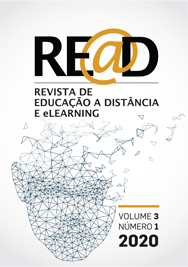Online Research Groups in the Training of Teachers-Researchers: producing Knowledge in Cyberculture
DOI:
https://doi.org/10.34627/vol3iss1pp6-18Keywords:
online research groups; research-training in cyberculture; learning environments; online conversations.Abstract
: Research groups tied to graduate programs are unique environments for the training of researchers, especially in the field of Education. Studying together, socializing and sharing knowledge in the context of institutional research, participating in collective orientations, mobilizing scientific multiliteracies, and organizing the scientific dissemination of research are just some of the daily activities of research groups. Since the advent of cyberculture, research groups have been working online, subverting the limits and constraints of face-to-face meetings. This article is the result of a research-training in cyberculture that, through the device of online conversation, sought to understand how online research groups are instituted and how they produce their curricular dynamics. The research field took place in the context of an important public university program in Rio de Janeiro, Brazil. Research practitioners were teachers and students who worked online with their research groups. The theoretical-methodological repertoire of the study sought to assemble the multi-referential approach with research with everyday life in cyberculture. The study found that the acts of teaching and all curriculum creation necessarily involve the concern with training as a social, political, academic, and affective experience.
Downloads
Published
Issue
Section
License
Copyright (c) 2020 Rosemary dos Santos, Edméa Santos, Dilton Ribeiro Couto Junior

This work is licensed under a Creative Commons Attribution-NonCommercial 4.0 International License.
Os autores conservam os direitos de autor pelo seu trabalho e concedem à revista o direito de primeira publicação, com o trabalho simultaneamente licenciado sob uma Licença Creative Commons - Atribuição-NãoComercial 4.0 Internacional.



